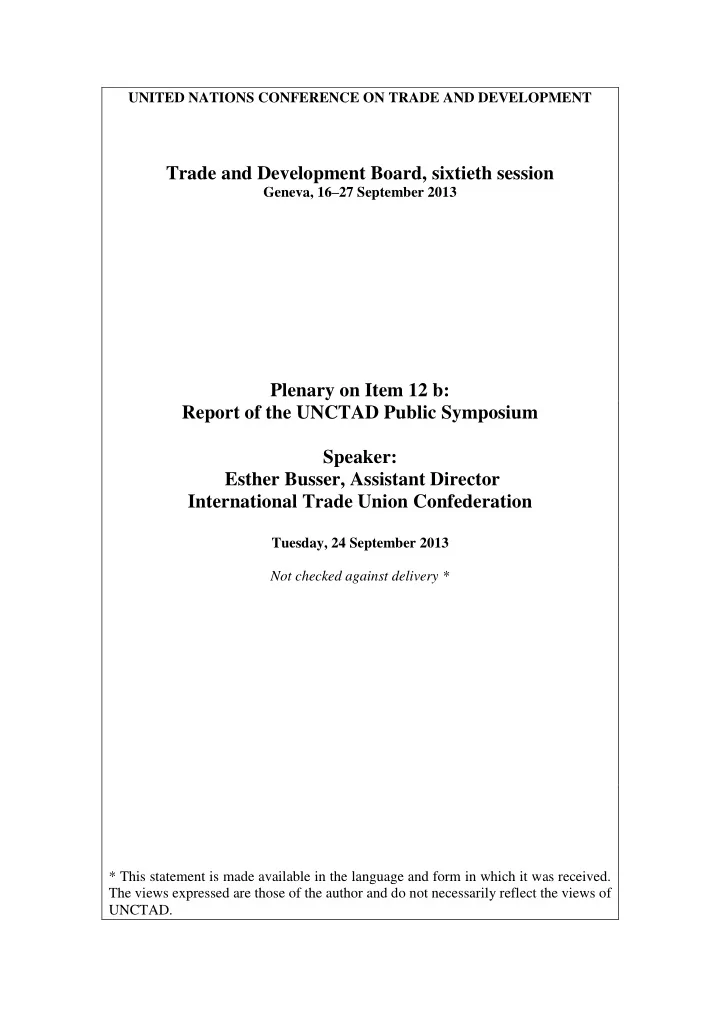

UNITED NATIONS CONFERENCE ON TRADE AND DEVELOPMENT Trade and Development Board, sixtieth session Geneva, 16 – 27 September 2013 Plenary on Item 12 b: Report of the UNCTAD Public Symposium Speaker: Esther Busser, Assistant Director International Trade Union Confederation Tuesday, 24 September 2013 Not checked against delivery * * This statement is made available in the language and form in which it was received. The views expressed are those of the author and do not necessarily reflect the views of UNCTAD.
Trade and Development Board 60 th session Presentation of the Report of the Public Symposium: “New economic approaches for a coherent post - 2015 agenda” Tuesday 24 September 2013 Esther Busser, Assistant Director, ITUC Geneva Office I would like to thank the Board for giving civil society the opportunity to present the report of the UNCTAD Public Symposium, held in June this year. The symposium was attended by over 300 participants and was once again an excellent opportunity for civil society to express itself in relation to UNCTAD’s work and to exchange ideas and views around the current state of the global economy and its’ challenges. It also provides a very useful space for joining forces on specific themes. My remarks today are based on the report of the public symposium that has been distributed to you. As I had already outlined in my intervention last week, the current state of the global economy is still very worrying and the outlook remains bleak. Importantly, the prevailing form of globalization has not yielded benefits for everyone and inequalities have further increased. One of the conclusions of the symposium was that significant attention has to be paid to the need to renew the global macroeconomic and financial governance, including through an increased participation by developing countries in decision- making processes. Such governance requires first and foremost sound financial regulation and in this context many symposium participants called for the specific implementation of a financial transaction tax. Such a financial transaction tax has also been at the centre of the ITUC campaign. Such a tax would not only counter speculative forces and reign in the financial economy which has had such devastating effects on the real economy, but also serve as a source of income for governments to deliver public goods, like social protection and investment in the green economy. Another important area of discussion at the symposium was around international trade agreements such as the ones negotiated in the WTO and various bilateral trade agreements which often hinder developmental progress. Participants called for a restructuring of international trade and investment agreements to ensure equitable sharing of benefits, as well as a restoration of national policy space. Participants also felt it was essential to limit the market power of companies operating in developing countries so as to establish adequate policy space, especially as pressures from
large agricultural producers for trade liberalization have created impediments to food security and development more generally. The commodity boom has led to many important opportunities for structural transformation in developing economies. However, discussions on Global Value Chains raised many concerns and underscored the need for self-reliant systems in agriculture and manufacturing with sound benchmarks for ensuring benefits of integration into the global economy. In the context of the post-2015 discussion, participants noted that sustainable development needs a holistic approach that considers environmental, economic and social factors. Focus on poverty reduction is highly desirable, but so are inequality targets which are not visible in the proposals for a post-2015 agenda currently on the table. Similarly, poverty reduction cannot substitute for the need for structural transformation in developing countries. Employment policies and targets were also highlighted as important in this context. We welcome the calls from the Deputy Secretary-General for an increased role for civil society in driving the design and implementation of a post-2015 development strategy. Meanwhile, participants expressed concern that efforts currently under way in New York do not address the systemic issues discussed at the Public Symposium. In this respect the participants highlighted the need for a paradigm shift in the development framework and the establishment of the developmental state. We further welcome and value the research work done by UNCTAD, which is ahead of the curve and has an important contribution to make to the post-2015 development agenda. It is crucial that this important work continues and that research and technical assistance is provided to developing country governments. More emphasis needs to be put on the implementation of better targeted policies. Finally, on the engagement with civil society, p articipants felt that UNCTAD’s involvement with civil society needs to be improved by allowing civil society organizations to participate as observers in intergovernmental negotiations, as is already the case in other United Nations bodies, such as the Committee on World Food Security of the Food and Agriculture Organization of the United Nations. After various successful sessions of the symposium it might also be the right time to institutionalize the forum and we would very much welcome such a decision. In conclusion I would like to thank UNCTAD for organizing the public symposium and for providing such an important forum for discussion. A special thanks goes to the UNCTAD staff who worked very hard to make the symposium a success. Thank you
Recommend
More recommend